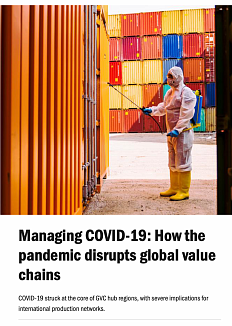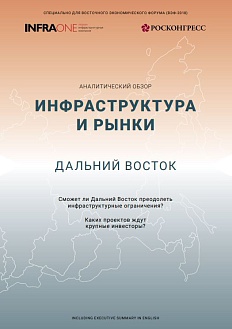In this publication, InfraOne Research studies the impact of the COVID-19 crisis on infrastructure projects. Experts explain how the struggle with the pandemic and its consequences will affect the infrastructure, which industry sectors will be affected the most and which might profit, and what kind of projects are to be expected in the post-viral new normal.
The Roscongress Foundation presents the salient points of the publication accompanied by fragments of broadcasts of relevant panel discussions from the business programme of key international events held by the Roscongress Foundation.
Judging from the experience of other countries, losses of companies connected with various kinds of infrastructure may be substantial
By the end of April, losses of Russian infrastructure companies may reach RUB 507 billion. Monthly revenues of enterprises operating in the infrastructure sector will sink by 60% on average.
InfraOne Research analysts estimate that by 1 May 2020 total losses of the infrastructure sector will reach RUB 507 billion. This amount includes lost profits due to restrictions introduced to counter the spread of the coronavirus epidemic since mid-March.
As regional authorities have been authorized to revise the duration of lockdown on their territories, the figures may be adjusted downwards in some regions. However, this applies only to regions with low population density so the effect on the total amount will be minimal. Judging from the experience of other countries, the period of restrictions usually continues for at least two or three months. This is why aggregate losses of Russian companies might turn out to be greater than expected. However, the scale of the damage will depend on the stringency and the duration of the epidemiological measures.
The transportation sector will be affected the most
The losses will be the greatest in the transportation sector, amounting to RUB 230 billion, of which nearly 60% (RUB 134 billion) will be accounted for by airports and airline companies. Companies in the energy sector may lose roughly RUB 125 billion due to shutdowns of some production facilities. The effect on the energy sector, however, will be less noticeable than on aviation because of the stable demand for energy from the population and constantly operating enterprises.
According to the authors of the publication, under an optimistic scenario where the restrictions on international air travel will be lifted in May, the aviation industry will lose approximately RUB 180 billion, of which RUB 30 billion will be accounted for by airports and RUB 150 billion by airlines. In a more pessimistic scenario where restrictions on travel will be in place throughout May, aggregate lost profits will exceed RUB 270 billion.
The most stringent restrictions are introduced in the social sphere so the revenues of many companies in this sector may drop by 95%
In absolute terms, the losses in the social infrastructure will be lower than in transportation and the energy sector, amounting to RUB 114 billion, but companies in this sector will find themselves in the most difficult situation because, measured as a percentage of normal revenues, the losses will be greater. During the lockdown, companies managing sports, recreation, entertainment, and cultural facilities may lose up to 95% of their normal revenues.
After the end of the lockdown period, companies in the entertainment sector (theaters, cinemas, concert halls, museums, zoos, etc) and the sports sector will require the greatest financial support. According to InfraOne Research current estimate, they will lose approximately RUB 38 billion.
The healthcare sector which is carrying an extra load now due to the struggle against the coronavirus epidemic is also suffering losses. Lost profits are reported by public and private healthcare institutions due to lower volumes of paid services, and also by private clinics which don’t provide emergency treatment (such as dental, ophthalmic, and plastic surgery clinics). InfraOne Research experts estimate that during the lockdown such companies will lose over RUB 30 billion due to a 80-85% drop in demand. On the other hand, the healthcare infrastructure may receive additional investments due to the struggle against the pandemic.
The hotel infrastructure is strongly affected by the restrictions. The losses in this sector will be near RUB 26 billion (which corresponds to a loss of 80-85% in occupancy) and will noticeably increase with the approach of the summer season because the tourist flow will be probably returning to normal slowly.
The effect of the lockdown regime on the sectors of alternative energy, transportation, utilities infrastructure, and telecommunications will probably be minimal
In transportation, the restrictions are currently having no effect on revenues of companies in river transport and road freight transport. In the river transport sector, most companies haven’t opened the navigation period yet, while the road transport is facing a redistribution in demand when certain categories of goods are replaced by other categories so that companies don’t see any significant decline in revenues.
In energy, the alternative energy sector remains stable, largely due to the fact that in Russia it operates on a small scale only, mostly on territories which have no access to regular energy sources, and it doesn’t «feed» large commercial consumers.
Heat supply infrastructure also remains unaffected by the lockdown regime due to the strong dependence of this sector on weather conditions. In telecommunications, despite the general upturn, revenues of companies that provide fixed line phone services without Internet connection may remain unchanged.
Some of the sectors which are expected to receive higher revenues due to the pandemic are telecommunications and information technologies
Telecommunications and information technologies are examples of sectors that may profit from the restrictions. Companies that provide services related to mobile communications, online services, and broadband access to the Internet will receive at least RUB 37 billion extra revenues. Moreover, some of the revenue growth may be retained after the end of the lockdown period.
Furthermore, the revenue growth in the next few months will probably be even greater because many companies currently focus on attracting new customers and provide their services at a discount or free of charge.
Telecommunications and IT, alongside healthcare, are the sectors which are likely to attract the attention of authorities and investors in the first few months after the end of the lockdown regime, due to, among other things, concerns about possible new outbreaks of coronavirus and other epidemics.
After the restrictions are lifted, healthcare, telecommunication, and IT will be the most appealing to investors
According to InfraOne Research analysts, after the restrictions are lifted, investors will be interested in the sectors of healthcare, telecommunications, and IT. Even before the lockdown regime was introduced, regions had been considering 13 PPP projects worth RUB 60 billion. The number of such projects will possibly grow soon because the authorities and private market players will start to discuss new initiatives aimed at overcoming the consequences of the pandemic and preventing new outbreaks.
Still, it will take a while before the economy returns to a stable condition. This is why infrastructure companies will continue to receive lower revenues for at least two to three months after the lockdown regime is lifted.
Video: https://roscongress.org/sessions/eef-2019-strategiya-zhkkh-2035-vzglyad-biznesa/search/#01:11:30.303
For more information about policy responses to the coronavirus outbreak and possible ways to stabilize the economy during the pandemic, please see the COVID-19 and StayHomeEconomy special sections of the Roscongress information and analytical system.






